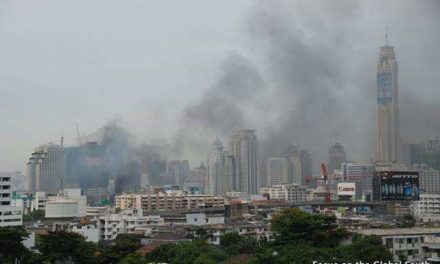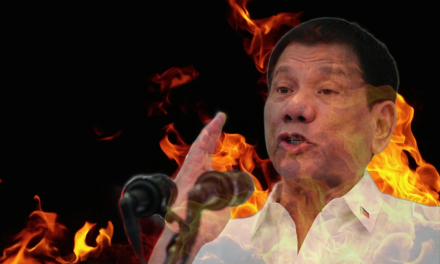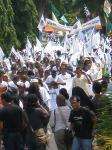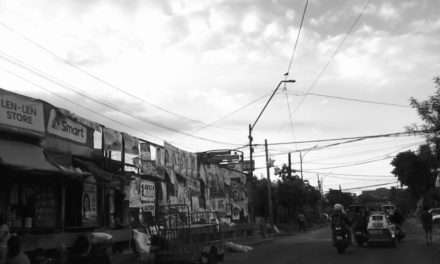After the World War II, the three revolutionary upsurges, namely the three movements of world socialism, national liberation in colonised countries and workers’ struggle in developed capitalist countries, constituted a synthesized and direct attack to both the stronghold and the backyard of capitalism. The struggle between capitalism and socialism, between the capitalist road and the non-capitalist road became the major contents of the transitional time from capitalism to socialism all over the world.
In response, the US, Britain and other capitalist countries sought to establish a new capitalist system to obtain global domination – the ambition the German and Japanese fascists once had failed to realise through war. The new capitalist system was to fulfil these three essential tasks – consolidating and reinforcing the capitalist countries’ alliance, of which the North Atlantic Treaty Organisation played the pivotal role; taming the Third World countries and bringing them back under the control of imperialism; and terminating the socialist system – the greatest menace to the survival of capitalism.
However, after the World War II, when people had just escaped from the hell of slaughtering and destruction, of concentration camps and human gas chambers, they tended to be more humanitarian and tolerant, and ardently wished for a peaceful and better life. Countries’ economies recovered and strongly developed. Capitalism embarked on an unprecedentedly long period of growth, seemingly challenging all theories on the chronic crisis circles. Reviving from the war, capitalism in 1950-1960 withdrew its fangs and claws and did its utmost to "peacefully emulate" with the socialist system obviously of great superiority in many aspects. The capitalism launched a new strategy, which first and foremost aimed at winning over the socialism in economic terms, provoked arm races to weaken the USSR and other socialist countries, supported Germany-Japan and the bourgeoisie governments in some formerly colonised countries of important geo-political position, and implemented some social policies to buy off workers and Trade Union’ s leaders.
It can be said that Keynes’ post-World War II model of capitalism was a transitional model that capitalists must temporarily accept amidst adverse world’s changes. Welfare States, Trade Union’s movements and democratic socialism existed in parallel with the newly-born socialism system. The struggle inside capitalism and the external changes both took effect and created a more human face for capitalism. It was in this period that "people’s capitalism" (!) was first mentioned. However, the real ideological foundation for post-World War II capitalism was the doctrine of neo-liberalism by Friedrich Hayek, a Nobel economic laureate who considered inequality not a failure of capitalism but an inevitable consequence and an indispensable condition for good performance of the economy. Capitalism ranks inequality as a major value not only within countries but also in international affairs. This is reflected through capitalism’s unequal development mentioned by Marxist-Leninist classics. Neo-liberalism is against State control over the market and against welfare state, which, according to its argument, encourages egalitarianism. Neo-liberalism views social justice as a destroyer to market’s freedom, citizen’s liberty and talent’s vitality – two major determinants of people’s success; considers it’s ideal to create conditions for the strong to win and the weak to lose; regards competition as the only motivation for development and opts for liberalisation, deregulation and privatisation as fundamental strategies. In 1948, with six percent population of the world the United States owned fifty percent of world assets. Advancing on that road of inequality, 50 years later, 25 million of US rich people, or 0.4% of the world population, have gained the wealth equal to that of two billion poor people, or 43% of the world’s population.
To maintain this disparity, no sooner had the war ended than the US and Britain gave birth to the International Monetary Fund (IMF), the International Bank for Reconstruction and Development (IBRD), usually known as the World Band, and the General Agreement on Trade and Tariffs (GATT), or the World Trade Organisation (WTO) since 1995. These are the three major instruments for capitalism to establish its global economic-financial and trade dominance. The delayed inception of the WTO is due to the inability to form a single market, given the existence, alongside the capitalist system, of the socialist system with totally different sets of rules and modes of production and exchange. Consequently, the US proposed to create a General Agreement on Trade and Tariffs (GATT) instead of an International Trade Organisation (ITO). GATT would constitute a set of rules that covered tariffs reduction, non-tariffs barriers removal and strictly limited room for Government’s intervention in private economy and trade. They argued that fast economic growth could only be achieved in such free trade.
This is a false rhetoric. Realities show the contrary. Extremely high tariffs barriers were indeed put in place in the stage of development and industrialisation in capitalist countries to protect their domestic industries. Tariff liberalisation had not been introduced until their domestic industries gained enough strength to compete with imported goods. In late eighteenth century, the industrial revolution began in Britain in favorable conditions brought about by pragmatic mercantilism for raising export of textile and other industrial goods. The principle of laissez-faire, Adam Smith’s theory of free market or David Ricardo’s theory of free trade were accepted in the United Kingdom only when the country had reached a far higher productive capacity over its neighbouring countries France and Germany.
In 1913, all big countries implemented protection policy. After its Civil War, the US implemented the industrial policy of import-substitution with the protection of a high tariffs barrier. Japan imposed protection tariffs for its industries in late 1890s after regaining the right to determine its tariff policy under the Meiji reign. France and notably Britain adopted economic liberalism, but not for the colonies which were forced to cede industrialisation. India, a Britain’s colony, had to implement de-industrialisation.
Obviously the realities over the past several centuries have shown that industrialisation and economic growth in developed countries were guaranteed by protection. Those who developed later, even the "tigers" or the "dragons", all took advantage of the struggle between the two socialist and capitalist camps to protect their fledgling industries. In early 1960s, when South Korea first embarked on its "miraculous" economic period, US assistance covered as many as 7% of South Korea’s GDP. If the US were also that "generous" to the subSaharan Africa, it had to spend a tenfold higher amount of assistance than at present, meaning US$ 20 billion instead of US$ 2 billion. No doubt about the importance of geo-politics!
The ministerial meeting in Doha has really pulled the WTO round after the debacle of the third ministerial meeting in Seattle. C. Fred Bergsten, a prominent partisan of the WTO, once said that this organisation is like a bicycle: it collapses if it does not move forward. By agreeing on a declaration giving momentum to new negotiations for liberalisation, the Doha meeting got the bicycle upright and moving again. Mike Moore, the WTO General Director, was not exaggerating when he thanked the ministerial for "saving the WTO" after the debacle two years ago in Seattle.
Doha meeting took place amidst conditions that were already unfavorable from the point of developing country interests. The September 11th events provided a heaven-sent for Robert Zoellick, the US Trade Representative and Pascal Lamy, the EU Trade Commissioner. They quickly seize this golden opportunity to increase pressure on developing countries and force the latter to agree to the launching of a new trade round which, according to their rationale, is needed to counter the global downturn that had been worsened by the terrorist actions. In fact, this "war against terror" is merely a pretext to justify the war for oil and minerals, for geo-political advantage and the demand of military expansion in the interest of TNCs. Thus, the war, which claims to revenge for the victims of the September 11th attack, is in nature a war against civilians, against all citizens’ rights to freedom; a war against the rule of law in the name of the ruling class’s order. It is an act of replacing anarchical terrorism by State terrorism, which actually resembles former colonial invasions. As the result, more pressure is imposed on developing countries by threatening that developing countries must be responsible for the possible failure of another ministerial meeting, the possible collapse of the WTO and the likely worsened global recession in the wake of the first two debacles.
Instead of acknowledging the failures and traps of trade, the trade ministers of big capitalist countries keep on urging the application of free trade principles in all fields of global trade, in rich and poor countries alike, leaving too little room for national strategies and putting aside such important social issues as environment and labour. Furthermore, they no longer respect the commitments they themselves previously made to ending their economic protection policies. They intentionally ignore the promises of giving special and differential treatment to poor countries. Obviously the increasing financial, investment and trade integration is demanding an equal and democratic form of economic management in the whole world.
Can the answer be the WTO? Many doubts remain over this organisation and the neo-liberalism it is practising, its endorsed partiality for rich countries and its opacity, which has become a so-called trade culture of developed countries. If the WTO is to maintain its relevance, it should be organisationally restructured, ideologically reformed and methodologically democratized. When the balance of power is tilting to capitalist countries and their controlled institutions, it is not easy to have a WTO that speaks for the rights of poor countries or at least is not so partial. However, if developing countries unite and manage not to be bribed, divided or lured by transient interests, then this is not totally unlikely.
The WTO general director Mike Moore wrote in the International Herald Tribune (p.8): My message to the conference will be blunt: trade is a major factor in development. The Doha development agenda, agreed upon last November, saw developing countries put conditionality on rich countries. And they will consider moving forward on the trade round if capacity-building promises are kept and market access is improved. According to Moore, the removal of all tariffs and non-tariffs barriers may earn developing countries as much as US$ 182 billion in services, US$ 162 billion in industry and US $32 billion in agriculture. He continues his rhetoric, saying that the benefits can still be bigger to under-developed countries thanks to US’s raising imports from these countries by 11 times. But this is 1960s’ experience: for every single dollar channeled from the North to the South, "only" three dollars flowed back to the North. At late 1990s, i.e. 30 years of globalisation and free trade, the rate has become 7 out of 1, meaning that the North takes back 7 dollars for every single dollar it gives to the South.
An Oxfam’s report on Fair Trade in April 2002 reveals that over 40% of the world’s population live in of low-income countries, but these 40% occupy exactly 3% of the world trade. Within the past decade, 5% of the world’s poorest have lost nearly a quarter of their real income, while 5% of the world’s richest risen by 12%. Out of every US$ 100 brought about by world export, US$ 97 flow to high-income countries, leaving on average only US$ 3 for low-income countries. For every 1 assistance dollar to poor countries, they rob back US$ 2 through unfair trade. Unfair trade takes US$ 100 from poor countries every year. If Africa, East Asia, South Asia and Latin America each could increase by 1% in the world trade, 128 million people would escape poverty. One more per-cent of Africa’s volume in the world’s trade could generate US$ 70 billion, which is 5 times bigger than the amount of assistance and debt reduction given to this continent.
Furthermore, rich countries impose fourfold higher tariffs on imports from poor countries than those from developed ones. In every assistance dollar, Africa loses 50 cents due to their plunging exports’ price. Since 1997, coffee price has reduced by 70%, costing coffee producers US$ 8 billion. The total daily agricultural subsidy by rich countries is as much as US$ 1 billion. This results in oversupply and dumping in international market, hence falling price and shrinking income to poor countries’ farmers. Many of the WTO’s rules on intellectual property rights, investment and services protect the interests of rich countries and mighty TNCs while impose heavy duties, and therefore, heavy damage, to developing countries. The world trade report is actually too gloomy to poor countries.
A recent report by the World Bank itself reveals the catastrophes on the globe. Rwanda’s maternal mortality rate is 1/40, 200 times higher than that of rich countries. Within the past decade, the life expectancy of Ugandan has reduced by 5 years, and that of South Africa fallen by as many as 14 years. This is caused by HIV-AIDS. The continent’s AIDS victims cannot afford the medicines by the pharmaceutical TNCs enjoying production and distribution monopolies under the umbrella of the WTO’s rules on intellectual property rights. This partiality raises doubts about the legality and legitimacy of the WTO.
The current situation is somewhat similar to the pre World War I period, with the former imperialist countries on one side and the former colonies on the other. The then missionaries are now replaced with the neo-liberalism advocates; the direct ruling regime with the prescription of structural reform, privatisation, liberalisation and deregulation, and the colonial officials by those of the International Monetary Fund and the World Bank, who sit haughtily in the capitals of developing countries and make decisions over budget affairs and even plans of privatising the whole economy, step by step dissolving the public sector and removing the collective economy. But these are not enough. Should their needs arise, they can even uphold the pretexts of “human right”, “anti-terrorism” to wage destructive bombings and send invading troops to other countries. It cannot but be something of a neo-colonialism, a “super-colonialism”
At present, the developed countries, especially the ringleader US, are trying to promote the victories in Doha. As discussed in the first plenary session of the Trade Negotiations Committee, the new round, which will tentatively last until January 2005, will cover services, agriculture, industrial tariffs, reforming of anti-dumping measures, market access, environment and regional agreements. Another ministerial meeting is tentatively scheduled in either September of October/2003 in Cancun or Acapulco, Mexico.
Cooperation and struggles should be companions; cooperating while holding fast to the principles of independence and sovereignty, accepting no form of interference into internal affairs and always mainly resorting to national strength. The imperialism’s nature is unchanged. The Seattle event reveals that the solidarity power of the world’s progressive people can intercept the intrigues of the neo-liberalism, while Doha shows that big countries do not exclude any possible artifice, including intimidating, buying off, coaxing, etc., to make the developing countries follow them, of which the defection of Nigeria and Kenya is a proving evidence. Most recently, president Bush signed a bill on agricultural subsidy of US$ 180 within the next 10 years, despite the objection of the developing countries, the US allies and the World Bank.
The struggle is going on, from Seattle to Doha, in different forms but with the same content: the solidarity of developing countries. This solidarity may be their sole weapon in the striving for a common goal of fair trade, for the sake of an inclusive development, the development of all people. The developing countries wish this round to be a Round of Development. However, this can only be achieved when they themselves unite and struggle.
*Nguyen Van Than is president of the Vietnam Italy Friendship Association and a member of the presidium of the Vietnam Union of Friendship Associations. He is also a board member of Focus on the Global South.





![[IN PHOTOS] In Defense of Human Rights and Dignity Movement (iDEFEND) Mobilization on the fourth State of the Nation Address (SONA) of Ferdinand Marcos, Jr.](https://focusweb.org/wp-content/uploads/2025/07/1-150x150.jpg)



